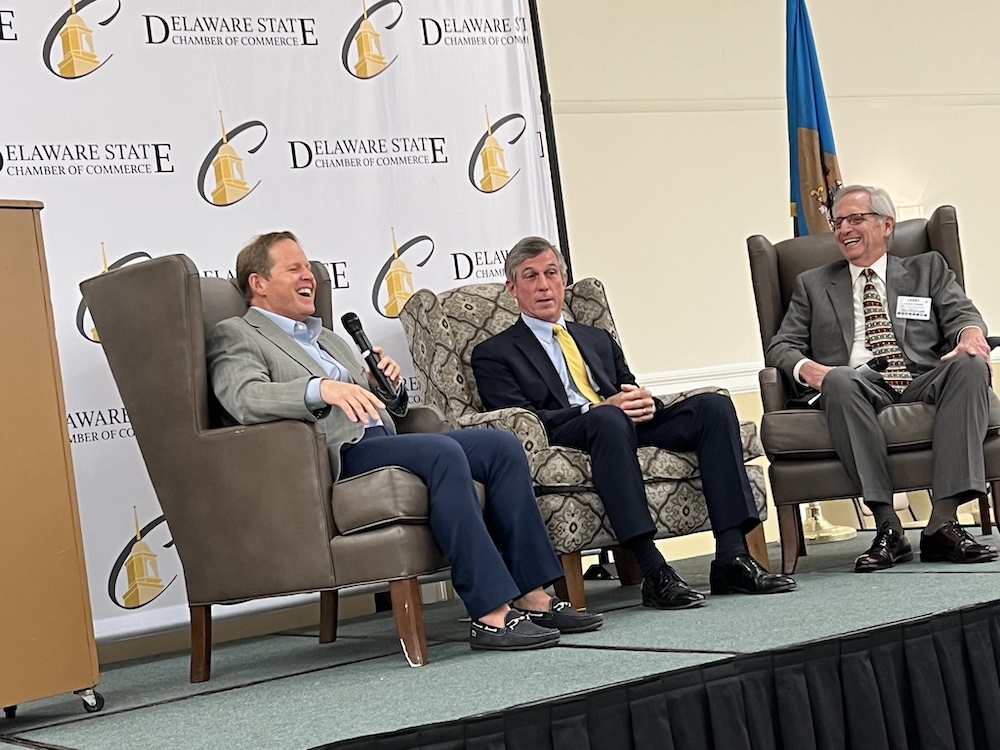Editor’s note: This story first appeared as a newsletter alongside a roundup of Technical.ly’s best reporting from the week, job openings and more. Subscribe here to get updates on Delaware tech, business and innovation news in your inbox on Thursdays.
Back in 2018, Delaware government officials and business representatives proposed an initiative called Ready in 6. The name refers to six months, which is how long it should take for a business to take up shop and become profitable in the state.
Not 24 months, which is Delaware’s current track record.
What is Ready in 6?
An independent analysis conducted by professional services firm KPMG honed in on the permitting process which holds up approvals for much longer than neighboring states. Dilly-dallying on the permit process isn’t just an inconvenience — it means Delaware is missing out on key opportunities to drive economic growth.
The idea was championed by a roundtable determined to make the business permitting process faster and more nimble, with coalition members including the likes of the Delaware Business Roundtable, Delaware State Chamber of Commerce, Kent Economic Partnership, Sussex County Economic Development Action Team, New Castle County Chamber and more.
According to this 2018 plan, here’s what it would take to be ready in one-fourth of the time: better communication; more efficiency and less paperwork; and more efficient tracking and use of data.
How’s it going today?
Cozied up in living room chairs at October’s Developing Delaware 2022 hosted by the Delaware Chamber, Gov. John Carney asked how Ready in 6 has been going for the past four years. Panelists Robert Boehringer III, managing director at KPMG, and Lawrence Moretti, principal at LFM Corporate Location Services, got real: We just aren’t there yet.
Why?
1. Delaware needs to get on the radar.
There’s still work to be done in branding Delaware as a place to land. We’ve got the product, now we need speed and branding, they said. Boehringer said as companies reconsider their global supply chain, Delaware needs a statewide marketing strategy. Cities like Philadelphia and New York have spread out, and it should be a strong play for Delaware to grab some of those companies that are looking around the mid-Atlantic region for a different kind of locale to lay roots.
2. There’s a need for speed.
Thinking like a business, how can we get to revenue fast? When businesses look to locate in the Delaware region, they aren’t looking for 24 months of waiting on certain department approvals. Mark Anthony Brewing was cited as an example: During the pandemic, the company went to Columbia, South Carolina and broke ground in eight days, then got product out the door in 346 days. The investor expectation is that speed matters.
“Delaware needs to continue to get better because the competition isn’t slowing down,” Boehringer said.
3. We have to hone in on our target businesses.
The question is, what are the right industries and sectors to be targeting? Mid-sized manufacturers is the right space to be playing in with a higher ROI on these smaller sites, the panelists said. Smaller sites could also mean quicker turnaround times.
Moretti, with expertise in corporate site selection, points to Richmond, Virginia marketing itself as a middle office hub. Similarly, cities like Wilmington can brand themselves as a middle market fintech hub. Compared to Nashville, which is overextended and has companies fighting for talent, Delaware has the capability to be a real contender in a place to bring your biz if we can get our vision and marketing straight.
In sum: Stay mindful of the program and product we want here, maintain the vision for the state, and continue to push for efficiencies that help companies break ground.

At Developing Delaware 2022. (Photo by Regina Donato, courtesy of the Delaware State Chamber of Commerce)
What do companies consider?
- Physical space — Having the right product, infrastructure and acreage to meet the demand of these projects
- Process — Municipal redundancy, e.g. how quickly they can repeat the business growth
- Quality of life
- Incentives
- A workforce ecosystem — Training and workforce development to sustain the operation well into the future
On that last point, panelists said to consider: How are we creating an ecosystem where these facilities can keep running into the future?
In the process now, a new employer comes to Delaware but hits a hangup when it comes to the workforce and filling these roles from Delaware.
Meanwhile, Sussex County is the fastest growing county in the Northeast and mid-Atlantic region, so a lot of the attraction lies in tapping into the talent there. Workforce development investments into research like biopharma at the University of Delaware can be ways to build the funnel right in the state, and result in breaking ground for large biopharma facilities like the one outside of Middletown.
High school training programs and non-college pathways to build a technical talent pipeline are key pieces to future-proofing, too, and include organizations like Quick Start that implements training on a large scale and coding bootcamp Zip Code Wilmington.
Where is the biggest hangup?
We don’t get the work done for these sites without the local folks. Per the experts, other cabinet agencies and departments in control of permitting are slowing down the road to getting us to that six-month target. It is a continued effort from cabinet agencies, workforce development, and top-down state leadership to get our two years’ turnaround time down to months.
Despite the progress, there is still a need for efficiency.
“The speed with which projects get done really needs a push from the top-down, highest offices in the state,” said Michael Petit de Mange, county administrator of Kent County.
Carney is on board: “We remain committed to Ready in 6, and we know there are additional things we can continue to do. We’ll continue to make progress with the Department of Transportation as well as the Department of Natural Resources and Environmental Control.”
###
What else happened in Delaware last week?
- Delaware made it through the midterm elections — our first with in-person early voting — with our one US House of Representatives seat going to incumbent Lisa Blunt Rochester. The run up to the annual Return Day parade and ceremonial burying the hatchet has, like most things, been more polarized than usual.
- CSC has closed an acquisition of Dutch competitor Intertrust for more than $2 billion, the biggest deal in the company’s 120+ year history.
- Delaware Art Museum, Delaware Division of the Arts and City of Wilmington are using American Rescue Plan Act funds to launch the Public Art Stewards Training Program, a six-month pilot program that will train Wilmington residents to clean, conserve and document 30 public artworks in downtown Wilmington and surrounding neighborhoods.
- Delaware Biotechnology Institute at UD and Delaware Bio have joined up to fund the appointment of Katie Lakofsky, Ed.D. to a new position that will lead the development and implementation of a comprehensive strategy to deliver a talent pipeline for the region’s biotech ecosystem. Dr. Lakofsky is currently the director of workforce development and community education at Delaware Technical Community College.
Join the conversation!
Find news, events, jobs and people who share your interests on Technical.ly's open community Slack

Delaware daily roundup: Delmarva Power vendor stats; DelDOT's $15M federal grant; 50 best companies to work for

Delaware daily roundup: Over 4,000 Black-owned businesses uncovered; Dover makes rising cities list; a push for online sports betting

Delaware daily roundup: Ladybug Fest illuminates small biz; Hahnemann Hospital's biotech future; intl. politics and a Middletown project


